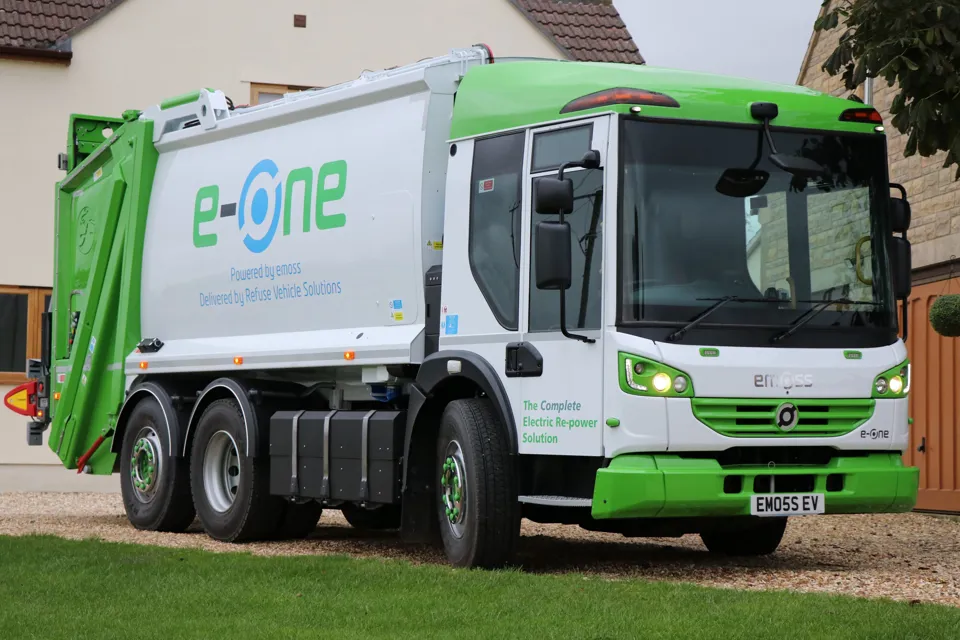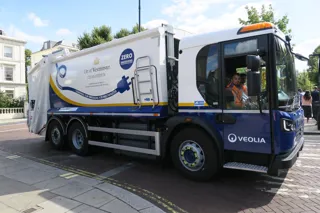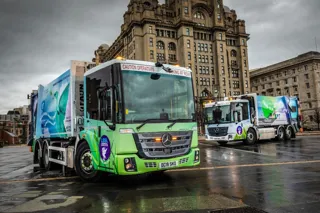Local authority fleets eager to cut emissions are having their diesel refuse collection vehicles refurbished and converted to run on battery power.
By doing so they can cut bin wagon running costs by up to £91 a day, adding up to £23,000 over the course of a year, as well as help clean up the environment, claims Netherlands-based conversion specialist Electric Mobility One Stop Shop (EMOSS).
Its conversions are now being carried out in the UK by Refuse Vehicle Solutions (RVS) under the e-One banner. The company is based in Dursley, Gloucestershire.
The work required can take eight-to-10 weeks, explains EMOSS head of business development, Vernon Edwards.
Technicians replace the engine, gearbox and fuel and AdBlue tanks with a 350kW electric motor and a 200kWh lithium-ion battery pack.
“The batteries can be recharged fully in 4.5 hours from a 63-amp power source,” he says.
A 26-tonne bin wagon on city centre rounds that has been re-equipped in this way should be able to achieve a 60-mile range between recharges, according to Edwards. The batteries also power the refuse compactor and bin lifts.
The daily saving is substantial because constant stopping and starting and the need to drive ancillary equipment means that an urban bin lorry may average no more than 3mpg; possibly less. Electricity is significantly cheaper per mile than diesel.
In addition, battery-powered trucks require less servicing than their diesel counterparts, Edwards points out, and do not attract charges when entering low-emission zones.
Nor are they subject to Vehicle Excise Duty (VED).
Repowering and rejuvenating an existing refuse truck costs less than half the £320,000-£330,000 it costs to buy a new battery-electric model.
A refurbished e-One from RVS comes with a five-year battery warranty while EMOSS’s conversion kit carries a two-year warranty. There is no reason why such conversions should not be applied to other types of specialised trucks, says Edwards, including skip wagons and hook-loaders.
Repowering is an option that is starting to appeal to independent waste fleets as well as to municipalities.
The first of the RVS/EMOSS e-One conversions has been acquired by The Recycling Partnership of Crawley, West Sussex, which collects commercial waste.
EMOSS can carry out other types of conversion and offers hybrid trucks fitted with range-extenders powered by liquefied petroleum gas.
It has been involved in producing an electric chassis for Swedish autonomous transport pod developer Einride.
It has also worked with Schmitz Cargobull on the electrification of refrigerated trailers, including the development of an axle with a regeneration capability.
The approach of EMOSS is not unique. City of London Corporation has opted to put seven battery-electric Dennis Eagle Elite 26-tonne refuse trucks into service converted by Electra Commercial Vehicles based in Skelmersdale, Lancashire.
The move follows a satisfactory experience with an electric Mercedes-Benz Econic 26-tonne bin wagon also converted by Electra.
It means that City of London has become the first UK local authority to run a fleet of fully-electric refuse trucks. It is doing so in conjunction with Veolia. The corporation runs a variety of other electric vehicles and a £250,000 sub-station has been installed so sufficient power can be supplied to its depot to recharge them.
In Sheffield, the city council has decided to operate two Elites converted to battery-power by locally-based Magtec.
Shorn of their engines and gearboxes, the trucks can carry around 500kg more than their diesel stablemates, says the authority.
While the 300kWh lithium-ion battery pack might be expected to weigh against their loss, it does not because it is being used to replace the ballast that would normally sits beneath the cab.
The ballast is there to counter the risk of a rear-axle overload. The battery pack is heavy enough to do the same job.




















Login to comment
Comments
No comments have been made yet.